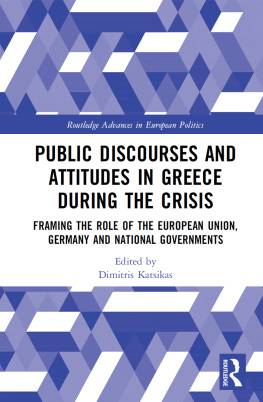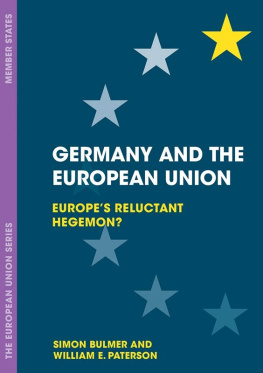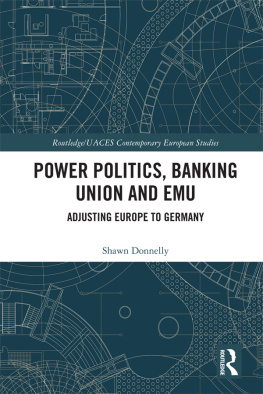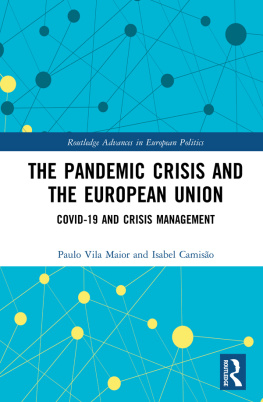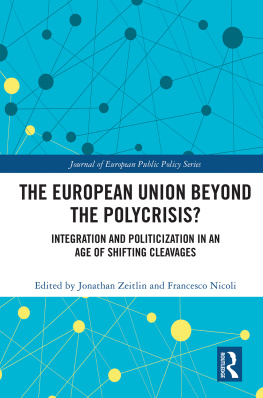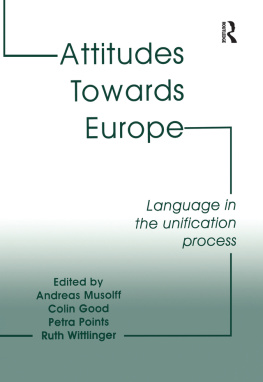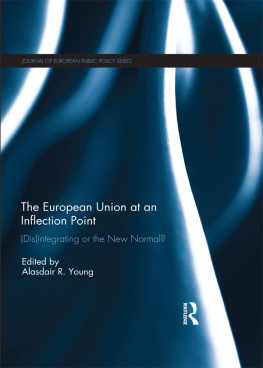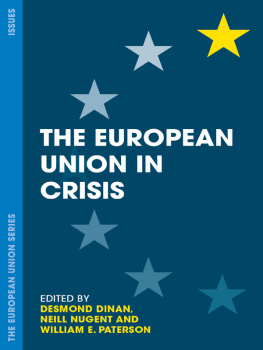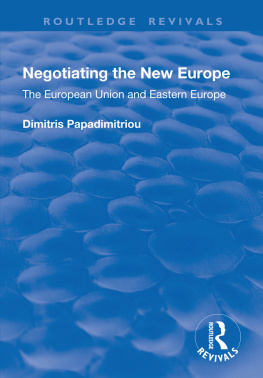Public Discourses and Attitudes in Greece during the Crisis
This book presents the findings of new empirical research regarding shifts in public discourses and attitudes in Greek society as a result of the crisis.
These findings show different shades of Euroscepticism and anti-German sentiments, but they also reveal a normative conflict within Greek society itself. The book shows how economic crises and strict policy conditionality, causing or deepening economic recession in the countries receiving it, has the potential to set in motion a fragmentation process, which transcends standard material stratification and relates to broader political and even cultural rifts among the population. With this, the book serves as a case study of the impact of wider pressures and shifts weighing upon the European Union (EU) and the way European societies perceive the integration process.
This text will be of key interest to scholars and students of European and EU politics, Greek and Southern European studies and more broadly to cultural and comparative politics and political economy.
Dimitris Katsikas is assistant professor at the National and Kapodistrian University of Athens and head of the Crisis Observatory at the Hellenic Foundation for European and Foreign Policy (ELIAMEP), Greece.
Routledge Advances in European Politics
The Populist Radical Left in Europe
Edited by Giorgos Katsambekis and Alexandros Kioupkiolis
External Energy Security in the European Union
Small member states perspective
Mat Mik
The Balkans on Trial
Justice vs. Realpolitik
Carole Hodge
Greece and Turkey in Conflict and Cooperation
From Europeanization to De-Europeanization
Edited by Alexis Heraclides and Gizem Aliolu akmak
Diversity of Patchwork Capitalism in Central and Eastern Europe
Edited by Ryszard Rapacki
The EU in Association Agreement Negotiations
Challenges to complex policy coordination
Daniel Schade
Public Discourses and Attitudes in Greece during the Crisis
Framing the Role of the European Union, Germany and National Governments
Edited by Dimitris Katsikas
For more information about this series, please visit:
www.routledge.com/Routledge-Advances-in-European-Politics/book-series/AEP
Public Discourses and Attitudes in Greece during the Crisis
Framing the Role of the European Union, Germany and National Governments
Edited by
Dimitris Katsikas
First published 2020
by Routledge
2 Park Square, Milton Park, Abingdon, Oxon OX14 4RN
and by Routledge
52 Vanderbilt Avenue, New York, NY 10017
Routledge is an imprint of the Taylor & Francis Group, an informa business
2020 selection and editorial matter, Dimitris Katsikas; individual chapters, the contributors
The right of Dimitris Katsikas to be identified as the author of the editorial material, and of the authors for their individual chapters, has been asserted in accordance with sections 77 and 78 of the Copyright, Designs and Patents Act 1988.
All rights reserved. No part of this book may be reprinted or reproduced or utilised in any form or by any electronic, mechanical, or other means, now known or hereafter invented, including photocopying and recording, or in any information storage or retrieval system, without permission in writing from the publishers.
Trademark notice: Product or corporate names may be trademarks or registered trademarks, and are used only for identification and explanation without intent to infringe.
British Library Cataloguing in Publication Data
A catalogue record for this book is available from the British Library
Library of Congress Cataloging in Publication Data
A catalog record has been requested for this book
ISBN: 978-1-138-73206-3 (hbk)
ISBN: 978-1-315-18867-6 (ebk)
Typeset in Times New Roman
by Lumina Datamatics Limited
Contents
DIMITRIS KATSIKAS
VASILIKI GEORGIADOU AND ANASTASIA KAFE
DIMITRIS KATSIKAS
YANNIS TSIRBAS
GEORGE N. TZOGOPOULOS
ASPASIA (SISSIE) THEODOSIOU AND MARIA ZAFIROPOULOU
DIMITRIS KATSIKAS
Vasiliki Georgiadou is Associate Professor at the Department of Political Science and History, Panteion University, Athens, Greece.
Anastasia Kafe is Research Associate at South East European Studies at Oxford (SEESOX) and at the Centre for Political Research (CPR), Panteion University, Athens, Greece.
Dimitris Katsikas is Assistant Professor at the Department of Political Science and Public Administration, National and Kapodistrian University of Athens, and Head of the Crisis Observatory at the Hellenic Foundation for European and Foreign Policy (ELIAMEP), Athens, Greece.
Aspasia (Sissie) Theodosiou is Associate Professor at the Department of Music Studies, University of Ioannina, and Researcher at DAISSy Group, Hellenic Open University (HOU), Patras, Greece.
Yannis Tsirbas is Lecturer at the Department of Political Science and Public Administration, National and Kapodistrian University of Athens, Athens, Greece.
George N. Tzogopoulos is Senior Research Fellow at Centre International de Formation Europenne (CIFE), Lecturer at the European Institute of Nice and Democritus University of Thrace, Greece and Senior Associate at Begin Sadat Center for Strategic Studies (BESA), Israel.
Maria Zafiropoulou is European Union (EU) Expert and Researcher at DAISSy Group, Hellenic Open University (HOU), Patras, Greece.
This book is partly based on the analytical ideas, data and findings produced in the context of the research programme Fragmentation and Exclusion: Understanding and Overcoming the Multiple Impacts of the Crisis Fragmex (http://www.fragmex.eu/). The programme was funded by the Greek General Secretariat of Research and Technology and the German Ministry of Education, during 20132015. The Greek part of the programme was implemented by the Crisis Observatory of the Hellenic Foundation for European and Foreign Policy (ELIAMEP) and the Hellenic Open University (HOU). I would like to thank the management and the administrative officers of ELIAMEP, the team of HOU and its coordinator, Associate Professor Achilleas Kameas and, of course, the projects scientific coordinator Dimitri A. Sotiropoulos, professor at the National and Kapodistrian University of Athens and Senior Research Fellow at ELIAMEP. Their support during the course of the project was indispensable.
The basic idea that inspired the project was that economic crises produce both a deterioration of living conditions, which leads parts of the population to socio-economic exclusion, and a cognitive or discursive fragmentation, which can also produce new kinds of exclusion. This book, the second to come out of the Fragmex programme, deals with the second type of fragmentation. Its empirical focus is Greece, because it is an ideal case study due to the depth and duration of the crisis it experienced and also because of its already deeply fragmented political economy and society. Beyond its obvious economic impact, the deep and prolonged crisis reshaped the Greek political system and its institutions, but, at a more profound level, it also affected the public discourse and attitudes of Greeks regarding both the country itself and its place in the European Union (EU). The resulting picture is a complex one. On the one hand, different shades of Euroscepticism and anti-German sentiments (given Germanys role in the handling of the crisis) were on the rise during the crisis. However, such attitudes were often mediated not only by the reluctant acknowledgement of practical necessities (e.g. the need to stay in the Eurozone), but also by a re-examination of the image of Greece itself and in particular of the accountability of the domestic political system for the countrys woes. The result is a society fragmented along different frames or ways of thinking about the crisis.

